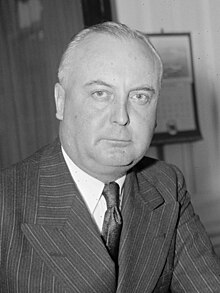|
Abe Murdock
Orrice Abram Murdock Jr. (July 18, 1893 – September 15, 1979) was an American attorney and politician who served as a member of both chambers of the United States Congress for Utah. From 1947 to 1957, he served as a member of the National Labor Relations Board. Early life and educationBorn in Austin, Nevada, he moved with his parents to Beaver, Utah, in 1898. Murdock attended the public schools and Murdock Academy in Beaver, and the University of Utah at Salt Lake City. CareerMurdock studied law and was admitted to the bar in 1922. Early political careerHe was a member of the Beaver city council in 1920 and 1921 and was county attorney in 1923–1924, 1927–1928, and 1931–1932. He served as city attorney of Beaver from 1926 to 1933, and was an unsuccessful Democratic candidate for district attorney for the fifth Utah district in 1928. CongressIn 1932, Murdock ran for and was elected as a Democrat to the Seventy-third Congress and was reelected to the three succeeding Congresses, serving from March 4, 1933, to January 3, 1941. SenateInstead of running for reelection in 1940, he challenged incumbent Senator William H. King for the Democratic nomination. King had opposed President Franklin Delano Roosevelt's proposal to expand the Supreme Court and Roosevelt's candidacy for an unprecedented third term, while Murdock was a "100% New Dealer" who strongly supported Roosevelt.[1] Murdock defeated King for the nomination and was elected as a Democrat to the Senate, serving from January 3, 1941, to January 3, 1947. Murdock was defeated by Republican Arthur Vivian Watkins in his bid for reelection in 1946. Later careerAfter his defeat, he resumed the practice of law and engaged in agricultural pursuits and livestock raising. From 1947 to 1957, he was a member of the National Labor Relations Board and in 1960 was a member of the Atomic Energy Labor-Management Relations Panel. Death and burialMurdock died of natural causes in Bethesda, Maryland, in 1979, and was interred in Mountain View Cemetery in Beaver, Utah. Electoral history
References
External links
|
|||||||||||||||||||||||||||||||||||||||||||||||||||||||||||||||||||||||||||||||||||||||||||||||||||||||||||||||||||||||||||||||||||||||||||||||||||||||||||||||||||||||||||||||||||||||||||||||||||||||||||||||||||||||||||||



